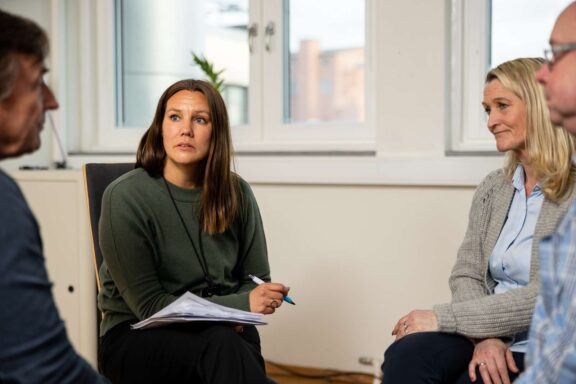What happens in a meeting at the Norwegian Mediation Service
The Norwegian Mediation and Reconciliation Service handle criminal and civil cases.
Criminal cases: An offence reported to the police, where the accused has acknowledged guilt, the prosecution has found the case to be suited for the Mediation Service and all parties have consented to meet.
Civil cases: An offence not reported to the police, the prosecution has dismissed the case, or conflicts between people in private matters and all parties have consented to meet.
A meeting at the Mediation Service, whether criminal or civil, is based on the parties needs, worries and expectations. It is voluntary to meet, and the parties may withdraw from the meeting at any time.

The mediator contacts the parties to offer a pre-meeting conversation to clarify different needs, prepare the parties for the meeting and schedule the mediation meeting.
If the parties are under 18, a parent or the legal guardian must approve any agreement made during the mediation meeting. The parties may or may not decide on an agreement.
The agreement can involve compensation in form of payment, work or other forms. The parties should consider the items they want to include in an agreement before the mediation meeting.
Mediators tasks
The mediator’s task is to provide a safe space for the parties to come together, despite their conflict, and help the parties put in to words their experiences. Before the parties address the conflict, the mediator will provide information about the meeting at the Mediation Service and the roles of the participants.
For any agreement to be valid, the mediator must approve the agreement.
The mediator has the right and duty to refuse an agreement that favours one of the parties to an unreasonable degree or is unfavourable for other significant reasons.
The mediator is impartial and bound by confidentiality.
Criminal cases
At the meeting, all parties get the opportunity to talk about their experiences, their reactions and feelings about what has happened. The parties – and not the mediator – are responsible for the content of any agreement. All parties can make suggestions as to what the agreement should contain. The parties sign a written agreement. If one of the parties is under 18 years, a parent or a legal guardian must also sign.
If the agreement involves a follow-up period, there’s a two-week’s cancellation period in which the parties may change their mind.
Civil cases
At the meeting, all parties also get the opportunity to talk about their experiences, their reactions and feelings about what has happened. There is no requirement for the agreement to be in writing, but it is a good idea to make a written agreement to document what the parties have agreed to.
If the parties wish, they can agree on a cancellation date, so that they have the possibility of withdrawing from the agreement. If one of the parties is under 18 years, a parent or a legal guardian must also sign.
Putting an agreement in writing also allows the Mediation and Reconciliation Service to follow up the case.
Criminal cases
The Mediation Service administration will send a copy of the agreement to the prosecution. When the agreement includes a deadline, the complainant shall inform the Mediation Service of its fulfilment. The case closes with the fulfilment of the agreement.
The prosecution also receives the result. If the agreement is broken, the police can reopen the case and evaluate taking other penal actions.
Criminal cases solved at the Mediation Service are not noted in the extracts from police records but will be included in the police certificate of good conduct for two years. The note in the record is deleted after two years, on condition that no new punishable offences are committed within these two years.
Civil cases
When the agreement includes a deadline, the complainant shall inform the Mediation Service of its fulfilment. The case closes with the fulfilment of the agreement. The Mediation Service will ask the parties if they would like a new mediation process when the agreements are not fulfilled.
 English
English Norsk (nynorsk)
Norsk (nynorsk) Norsk (bokmål)
Norsk (bokmål) Lulesamisk
Lulesamisk